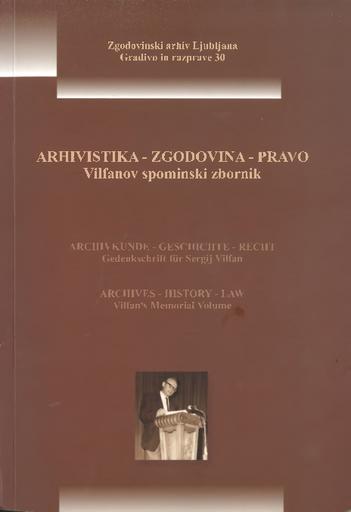/
Literatura
/
Monografije
Wurzeln des europäischen Naturschutzdenkens in Neuenglan

Avtor(ji):Karl H. L. Welker
Soavtor(ji):Nataša Budna Kodrič (ur.), Tatjana Šenk (ur.), Magda Lojk (lekt.), Doris Debenjak (prev.), mag. Niko Hudelja (prev.), Katarina Kambič (prev.), Martin Cregeen (prev.), Tatjana Rodošek (foto.)
Leto:2007
Založnik(i):Zgodovinski arhiv Ljubljana, Ljubljana
Jezik(i):nemščina, angleščina
Vrst(e) gradiva:besedilo
Zbirk(e):Gradivo in razprave : 30
Datoteke (1)

Ime:arhivistika_zgodovina_pravo1.pdf
Velikost:26.99MB
Format:application/pdf
Stalna povezava:https://hdl.handle.net/11686/file25390
Opis
The question as to when legally relevant nature Conservation thought began is sub
ject to dispute. Politically effective and undoubtedly sustainable legal nature Conservation
began in parks, in which nature was preserved on the basis ofits own value. Such
public parks were created after 1860 in the United States. The history ofYellowstone
Park which was founded in 1872 can be viewed as the beginning of the legally as well
as historically relevant Conservation thought. Insofar as the American national parks
posed a material challenge to the beginning homeland protection movement, their
philosophical foundations in Europe remained for the most part unnoticed.
In Europe it was mosdy the historically arisen environment which was intended to
be preserved, whereas in the American approach the experience of nature was in the
focus. The admiration of nature should not take part from the perspective of a spectator,
but in direct contact with the elementary forces. For the legal historian, the
problem lies in the specification of the point in time in which the valuation of natureclose
life was transposed into a demand for the preservatton ofspecific landscapes. Inspired
and supported by European theological arguments, in particular those of Rousseau and
Schelling, in the New England ofthe 1840s, the civilization-critical school of
thought arose called transcendentalism. The main proponent of transcendentalism,
taught a form of self-observation, which connected the degree of subjective freedom
with the degree of natural behavior. His student HDT radicalized this view and made
political in the 1850s the independent, distant-from-state lifestyle he practiced. In the
course of the beginning dispute between the Northern and Southern States Thoreau’s
convictions provided a moral justification for the Northern States. His thought and
self-view oriented themselves along the lines ofthe original way oflife, its valuation in
the consequence increasingly influenced the self-picture ofthe United States.
One consequence of this was not only the recognition of typically American landscapes,
a romanticisation of Native Americans and the creation of inner-city parks,
but also the beginning of the Conservation Movement. Without the leading function
of Emerson and Thoreau these movements could not have established themselves.
John Muir transposed these philosophical foundations into practice.
Metapodatki (10)
- identifikatorhttps://hdl.handle.net/11686/41418
- naslov
- Wurzeln des europäischen Naturschutzdenkens in Neuenglan
- Foundations of European Nature Conservation thought in New England
- ustvarjalec
- Karl H. L. Welker
- soavtor
- Nataša Budna Kodrič (ur.)
- Tatjana Šenk (ur.)
- Magda Lojk (lekt.)
- Doris Debenjak (prev.)
- mag. Niko Hudelja (prev.)
- Katarina Kambič (prev.)
- Martin Cregeen (prev.)
- Tatjana Rodošek (foto.)
- založnik
- Zgodovinski arhiv Ljubljana
- zbirka
- Gradivo in razprave : 30
- datum
- 2007
- 01. 01. 2007
- tip
- besedilo
- jezik
- Nemščina
- Angleščina
- jeDelOd
